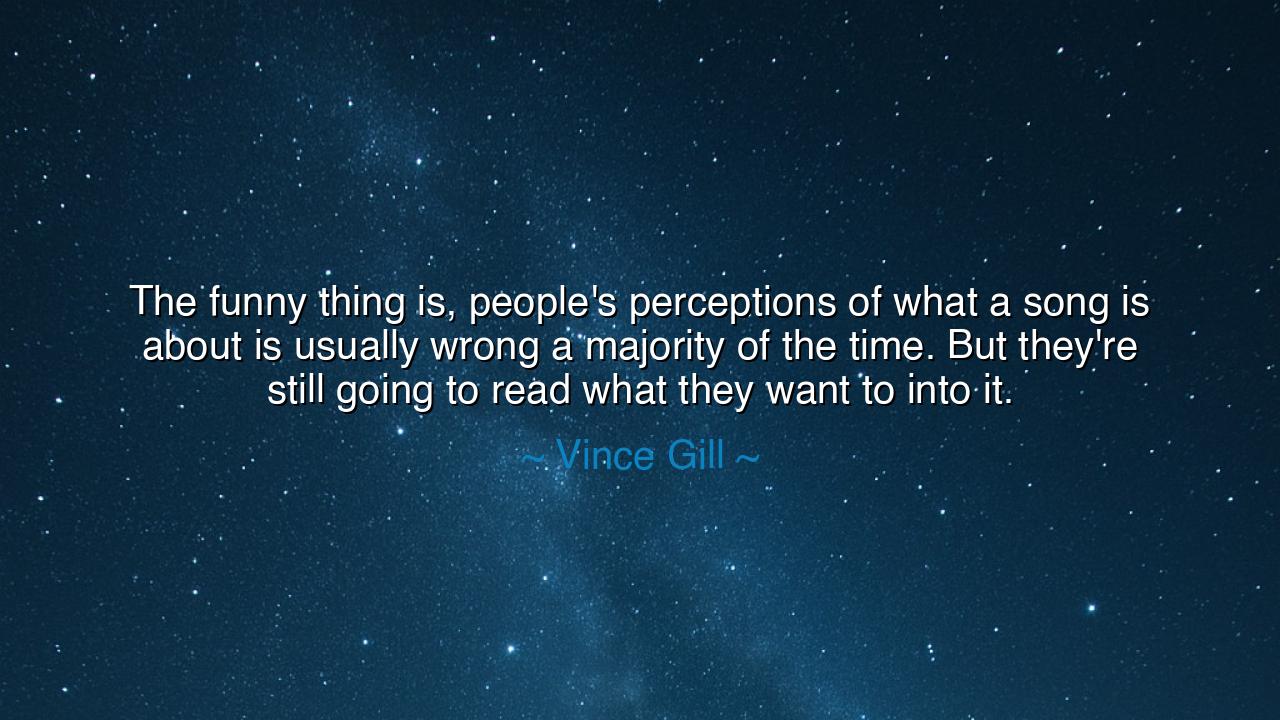
The funny thing is, people's perceptions of what a song is about
The funny thing is, people's perceptions of what a song is about is usually wrong a majority of the time. But they're still going to read what they want to into it.






“The funny thing is, people’s perceptions of what a song is about is usually wrong a majority of the time. But they’re still going to read what they want to into it.” — thus spoke Vince Gill, the troubadour of country and soul, a man whose voice carried both tenderness and truth. In this reflection, he reveals a paradox as old as art itself: that once a song, a poem, or a story leaves the heart of its creator, it no longer belongs entirely to them. The artist’s meaning gives birth to the work, but the listener’s perception gives it life. And though they may differ — sometimes vastly — both are part of the sacred dialogue between creation and humanity.
Vince Gill, a master of songcraft and storytelling, has spent a lifetime translating emotion into melody. His words here do not come from frustration, but from wisdom — the acceptance that every listener carries their own heart into a song. What one person hears as grief, another may hear as hope; what one finds tragic, another may find redemptive. A song, once sung, becomes a mirror — it reflects not only the soul of the singer but also the longings of the listener. Thus, Gill reminds us that art lives through interpretation, and that misunderstanding, too, is a kind of truth — for it reveals the inner world of the one who listens.
This idea is as ancient as the first stories told beside the fire. The Greek poet Homer, whose Odyssey has survived thousands of years, wrote of longing, courage, and the ache of homecoming. Yet through the ages, men and women have read vastly different meanings in his tale. For some, Odysseus’s journey is a story of perseverance; for others, it is a meditation on human pride. Homer, were he to hear all these interpretations, might smile as Vince Gill did — for every listener remakes the song in their own image. Art, like the wind, changes form depending on where it passes and whom it touches.
There is something deeply human in this. We see the world not as it is, but as we are. When we listen to a song or read a story, we do not approach it as blank pages; we bring our memories, our wounds, our hopes. A heart that has loved and lost will hear sadness even in a joyful tune. A spirit newly awakened to love will find light even in the deepest lament. Thus, perception is not a flaw — it is the natural echo of the soul meeting art. Gill’s humor — his “funny thing” — lies in this very truth: that though people are “wrong” in a literal sense, they are right in their feeling. For a song means whatever it awakens in the heart.
Consider Leonard Cohen, whose haunting hymn Hallelujah has been sung by countless voices, each giving it new life. Some hear it as a sacred prayer; others, as a confession of love and loss. Cohen himself once said, “Many people have told me what that song means to them, and they are all right.” In this we hear the same spirit as Vince Gill’s wisdom — the understanding that art’s power lies not in control, but in surrender. To create is to let go. Once born, the song belongs to the world, and each listener becomes its co-author.
There is, however, a gentle warning in Gill’s words as well — a call for humility. He reminds us that perception is not possession. To “read what we want into” something can bring beauty, but it can also blind us to the creator’s intent. The wise listener listens twice — once with the heart, and once with the ear of understanding. It is noble to feel deeply, but it is also noble to seek truth. In this balance lies the highest form of appreciation — to let a song speak to us freely, yet still honor the soul who composed it.
Let this, then, be the lesson: that art is alive only when it meets the heart of another. Do not fear if others misunderstand your work, your words, or your intentions — for misunderstanding is proof that they have felt something, and feeling is the pulse of meaning. Likewise, when you encounter the art of others, listen not only for what you expect, but for what is truly there. For in every song, as in every soul, there are layers unseen, waiting for the listener who approaches with openness and grace.
So spoke Vince Gill, and his words echo the wisdom of all creators who have sent their songs into the unknown. When people “read what they want into it,” smile — for it means your work has reached them. It has become theirs. And in that exchange — between your truth and theirs — something divine occurs. The song, the poem, the art, becomes eternal. For though the meaning may change with every ear that hears it, the feeling endures, and that, dear listener, is the truest music of all.






AAdministratorAdministrator
Welcome, honored guests. Please leave a comment, we will respond soon